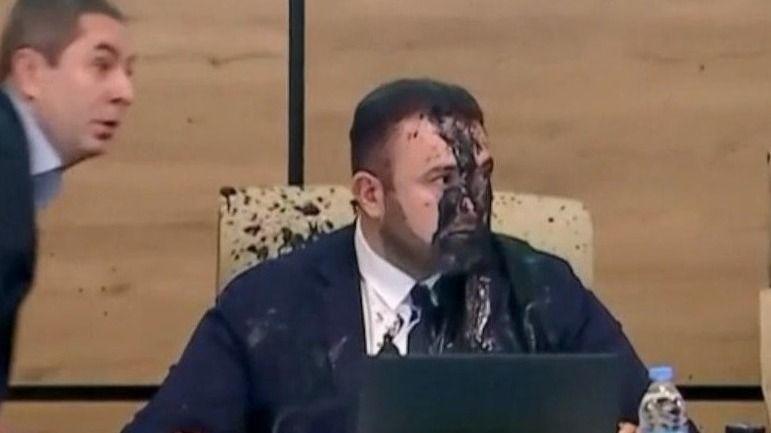Police use water cannon as Georgia EU protests erupt for second night
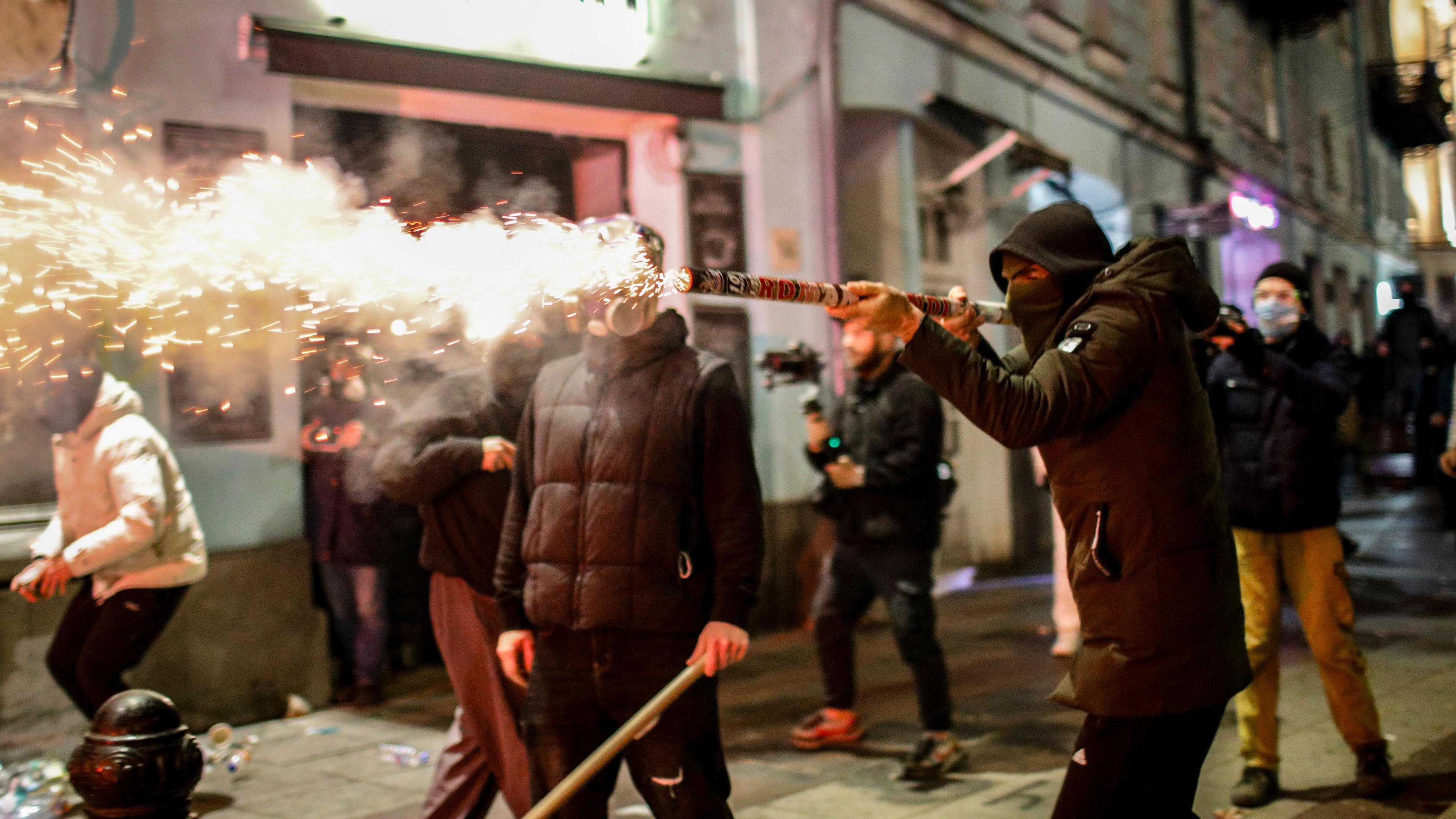
- Published
Thousands of protesters returned to the streets of Tbilisi on Friday to protest against the government's decision to suspend accession talks with the European Union.
Demonstrators were seen shouting "traitors" and holding photographs of journalists who they say were beaten by police in the previous night's protests.
For the second night running, police deployed tear gas and made heavy use of water cannon against the demonstrators.
President Salome Zourabishvili said "the resistance movement [had] begun" and that she stood "in solidarity with it".
"We will remain united until Georgia achieves its goals, to return to its European path, secure new elections," she said in a televised address, external.
More than 100 arrests were made for disobeying police officers and "petty hooliganism", Georgia’s interior ministry said in a statement.
Protestors threw pyrotechnics, stones and glass bottles, it added, with 10 officers injured in the unrest.
Prime Minister Irakli Kobakhidze thanked police on Saturday, telling a press conference they had "defended Georgia's constitutional order and safeguarded the nation's sovereignty," AFP news agency reported.
Meanwhile, the country's human rights ombudsman warned of "brutality that has no justification" after visiting some of the arrested protestors.
"One of the detainees had his entire face covered in bruises," Levan Ioseliani told reporters.
"I once again call on the police not to exceed their authority during detention."
BBC reports from mass protest at 'crucial moment for Georgia'
Earlier on Friday, over 100 diplomats and civil servants in Georgia signed an open letter saying the government's decision did not align with Georgia's strategic interests.
Defending his decision, Kobakhidze accused the EU of "blackmail" after EU legislators called for last month's parliamentary elections in Georgia to be re-run. They cited "significant irregularities".
Since 2012, Georgia has been governed by Georgian Dream, a party which critics say has tried to move the country away from the EU and closer to Russia.
The party claimed victory in last month's election but opposition MPs are boycotting the new parliament, alleging fraud, while the country's President Zourabichvili - who is at loggerheads with the governing party - has called the one-party parliament "unconstitutional".
On Thursday, the European Parliament backed a resolution, external describing the election as the latest stage in Georgia's "worsening democratic crisis" and saying that the ruling party was "fully responsible".
It expressed particular concern about reports of voter intimidation, vote-buying and manipulation, and harassment of observers.
The European Parliament also urged sanctions against Georgia's prime minister and other high-level officials including the billionaire founder of the governing party Bidzina Ivanishvili.
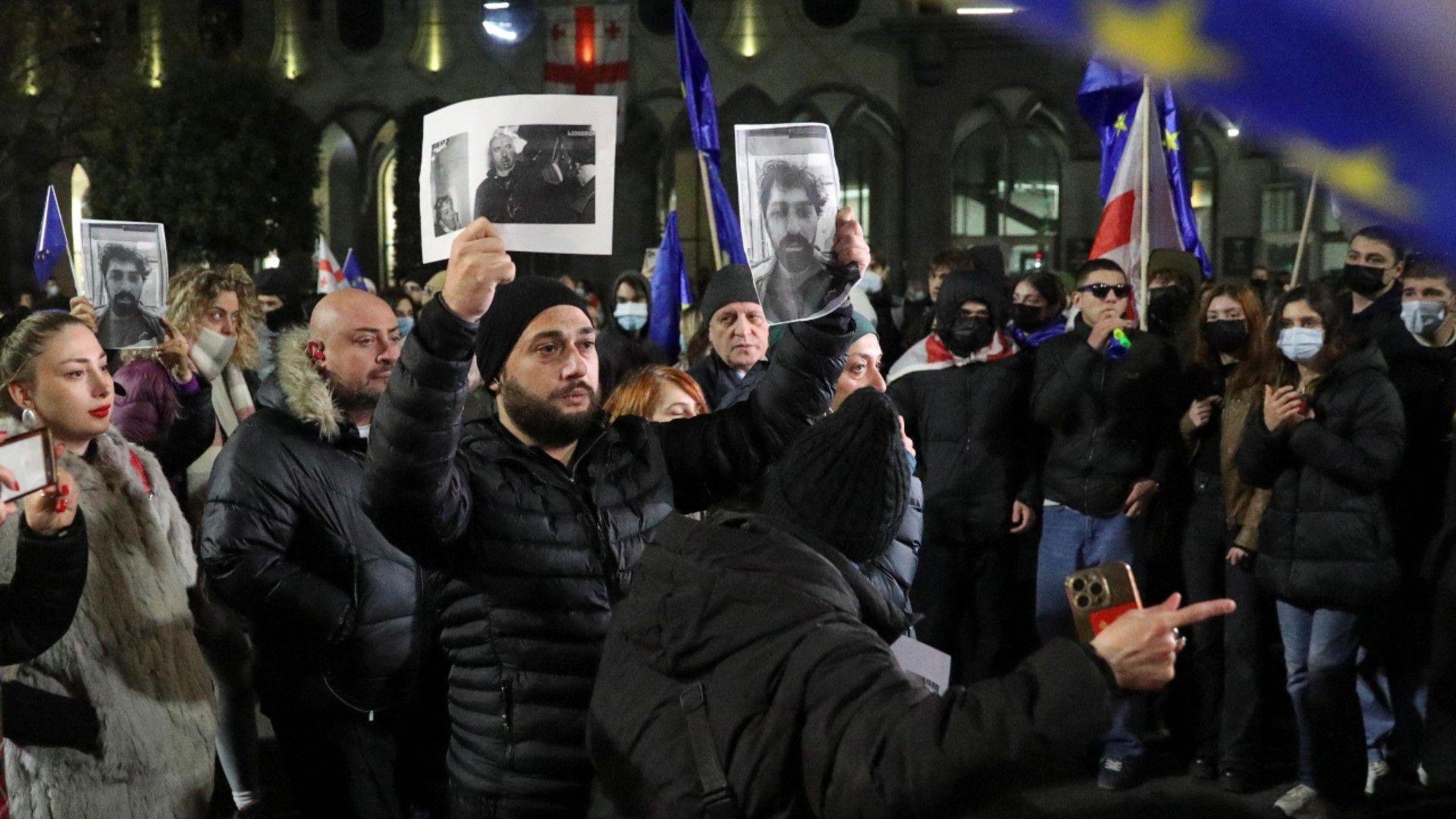
Demonstrators could be seen on Friday holding photographs of journalists who they say were beaten by police overnight
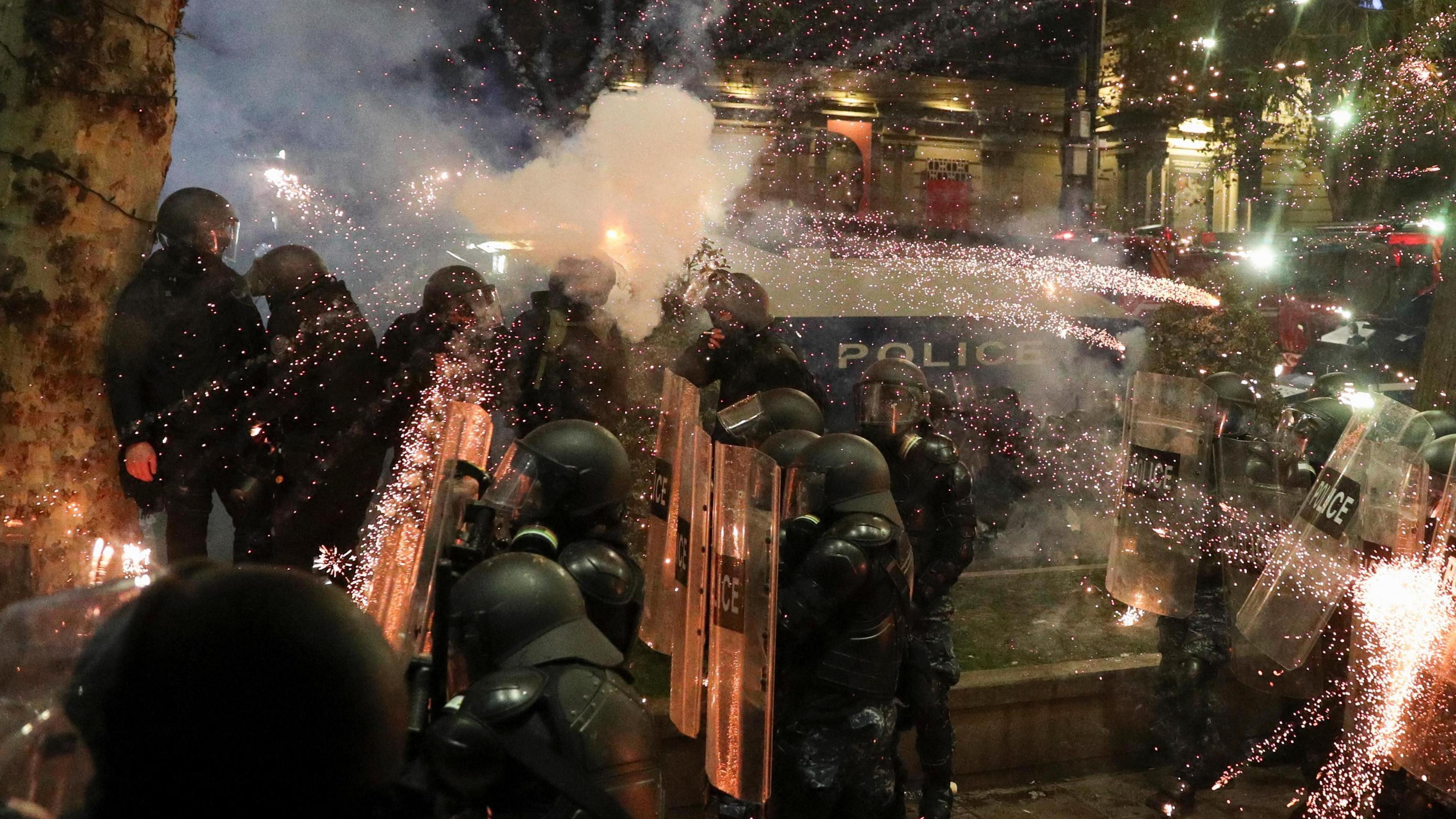
A firework explodes near police officers at the protests on Friday
Following the resolution, Georgia's prime minister said his government had "decided not to bring up the issue of joining the European Union on the agenda until the end of 2028".
He said Georgia would still seek EU membership but with "dignity" and on its own terms.
Kobakhidze also lashed out at European politicians for "hurling a cascade of insults" at the Georgian government.
In response, thousands of pro-EU protesters started demonstrating outside Georgian Dream offices in the cities of Tbilisi and Kutaisi on Thursday.
Protesters see the government's U-turn as a betrayal of a national aspiration.
The goal of European integration is enshrined in Georgia's constitution.
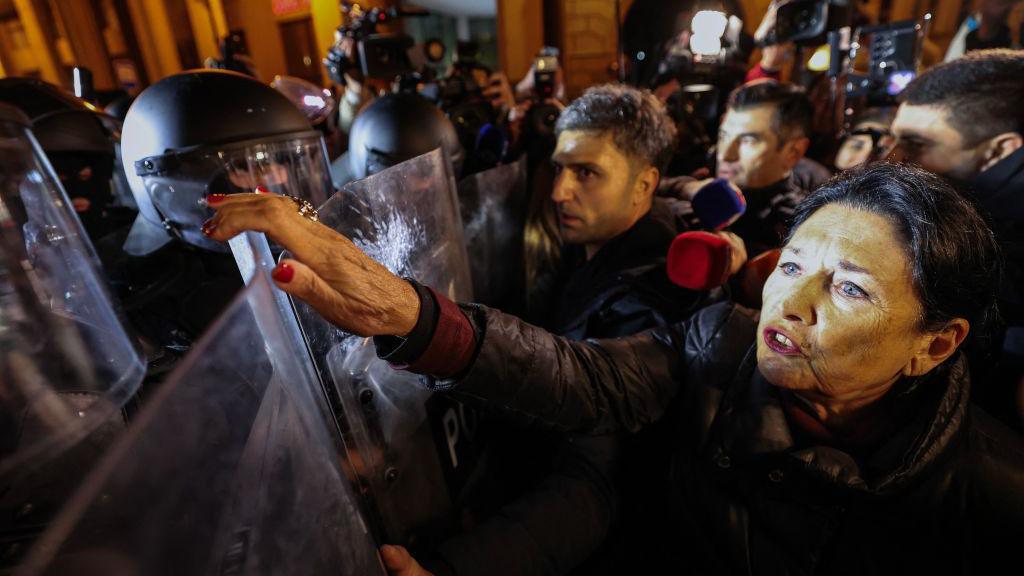
President Zourabishvili (right) attended the protest on Thursday, with local media reporting she approached officers directly
During the first night of protests, police used batons, tear gas and water cannon after demonstrators barricaded some streets in Tbilisi.
Georgia's interior ministry said protesters resorted to provocations on many occasions, damaging infrastructure and "badly injuring" 32 police officers.
The precise number of injured protesters is unknown, but a member of the opposition group Coalition for Change said one if its members, Nana Malashkhia, had their nose broken.
"During the crackdown, we took shelter in a pharmacy, but the special forces stormed in after us. If it was not for the presence of the media, they might have beaten us to death," Giorgi Butikashvili told the BBC.
Footage on social media also showed a journalist from the opposition Formula TV station being severely beaten by the police.
Other media representatives wearing clearly marked press labels were also targeted.
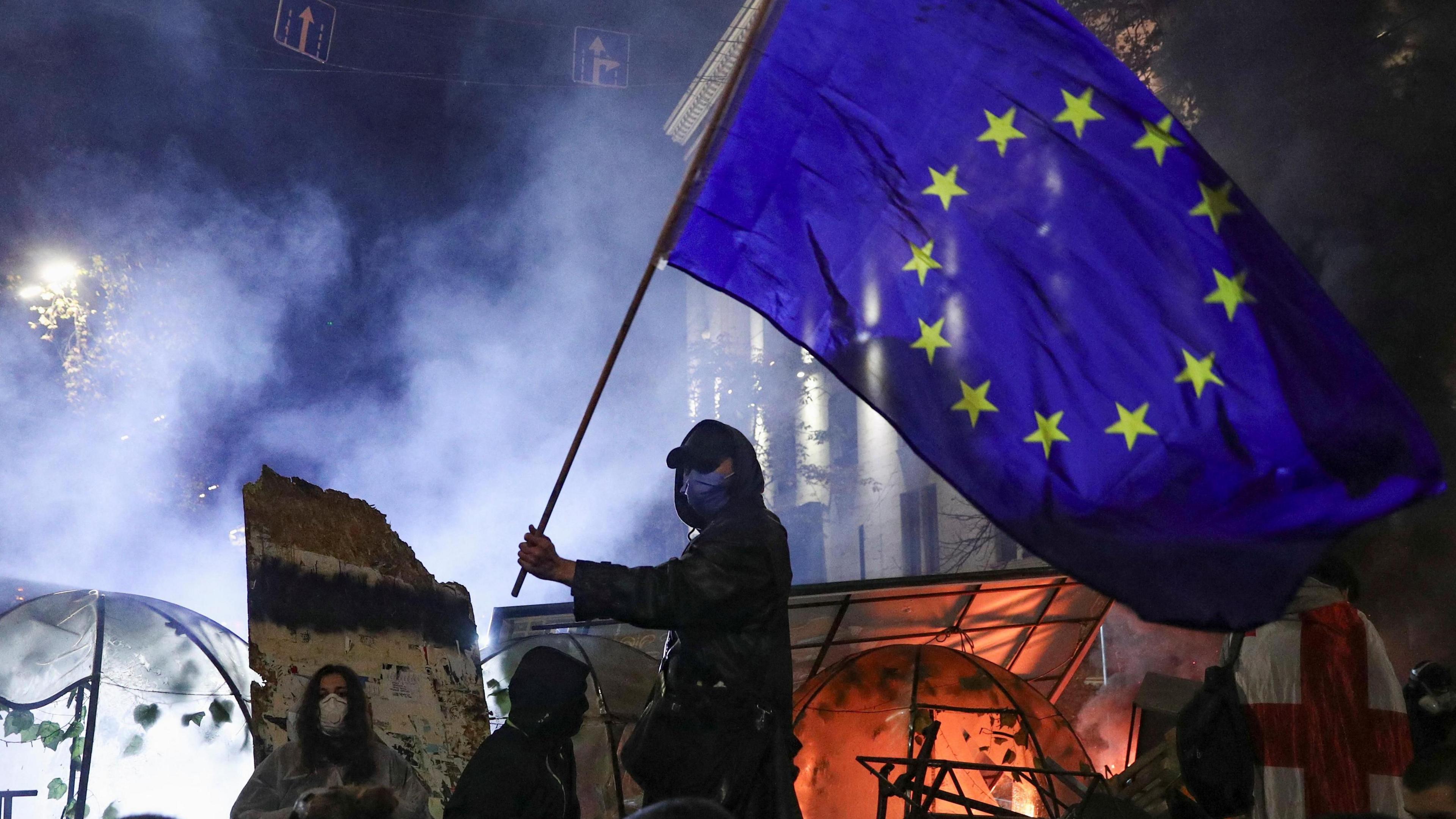
A protester told the BBC that Georgians want a "better future" as part of the EU
The EU's ambassador to Georgia called the government's suspension sad and heartbreaking.
Pawel Herczynski said it contradicted the policy of previous governments and the wishes of the vast majority of the population.
Public polling has shown more than 80% of Georgians see their country's future as being part of the European Union.
"Georgian Dream didn't win the elections. It staged a coup," 20-year-old Shota Sabashvili told AFP news agency.
"There is no legitimate parliament or government in Georgia. We will not let this self-proclaimed prime minister destroy our European future."
Ana, a student, said Georgian Dream was "going against Georgian people's will and want to drag us back to USSR".
"That will never happen because Georgian people will never let this happen," she told the Associated Press.
Uta, a protester, told the BBC that Georgians want a "better future" as part of the European Union.
"We don't want to be part of Russia anymore", he said.
Another protester, Vakho, said the government's actions were disappointing and not representative of the "Georgian people's will".
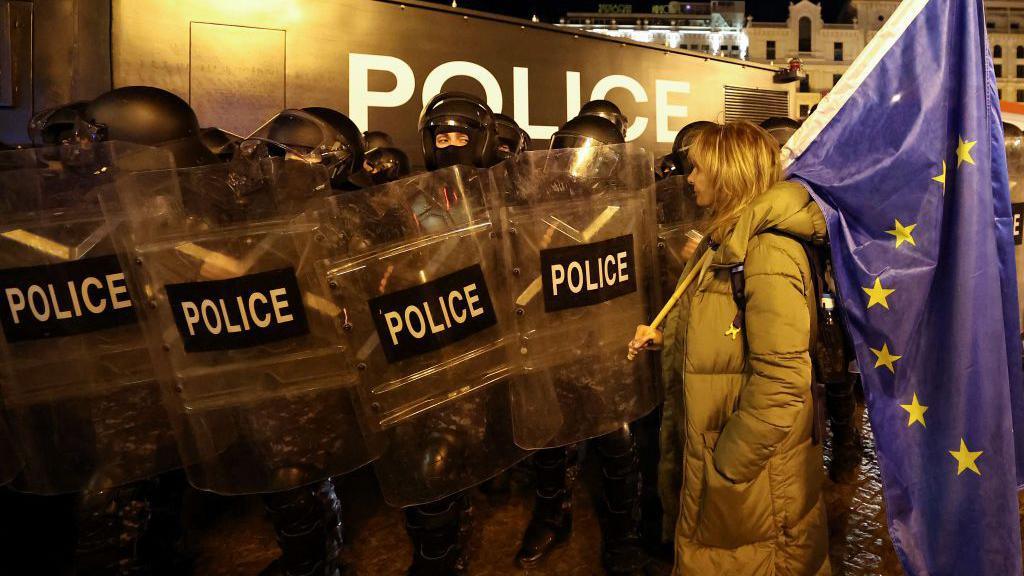
Georgia has had official EU candidate status since 2023. However Brussels had already halted the accession process earlier this year over a Russia-style law targeting organisations accused of “pursuing the interests of a foreign power”.
Kobakhidze said Georgia would continue to implement the reforms required for accession and that it still planned to join by 2030, but added that it was "crucial for the EU to respect our national interests and traditional values".
Former Georgian President Giorgi Margvelashvili told the BBC the country was at an "unprecedented" turning point.
"Since we were independent 30 years ago, we were clearly pro-Western, we were clearly pro-Nato and clearly pro-EU and this was uniting any government that was in place."
But now, he added, there was an effort "by the bunch of people who are controlling power in Tbilisi and the Kremlin to basically bring Georgia as fast as this is possible to Russian orbit".
Georgia's ambassador to Bulgaria also resigned in protest. Otar Berdzenishvili said he had over a two-decade career worked extensiely on progressing Georgia's EU integration.
"Our tireless efforts must not be shaken or compromised under any circumstances. No, violence against the free will of peaceful protesters, full solidarity with them."
Related topics
- Published14 May 2024
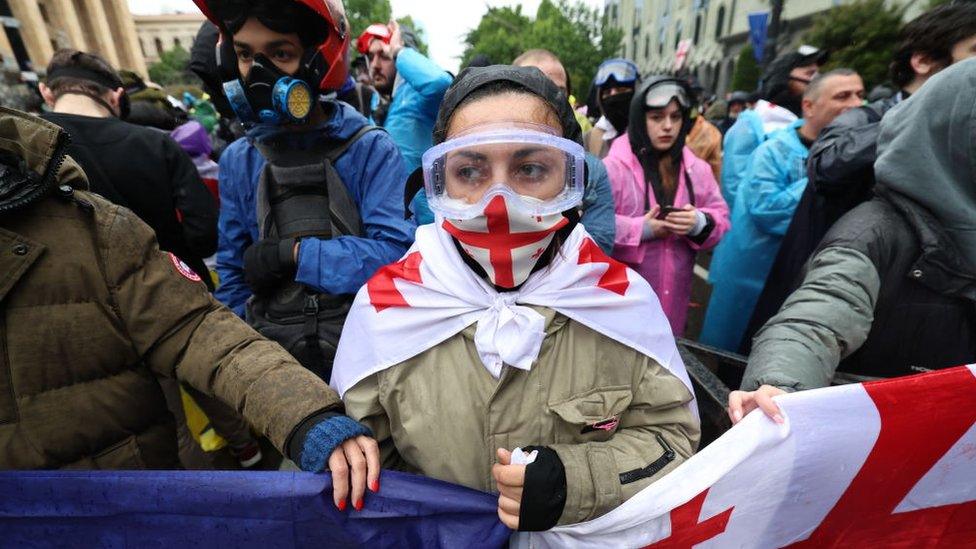
- Published19 November 2024
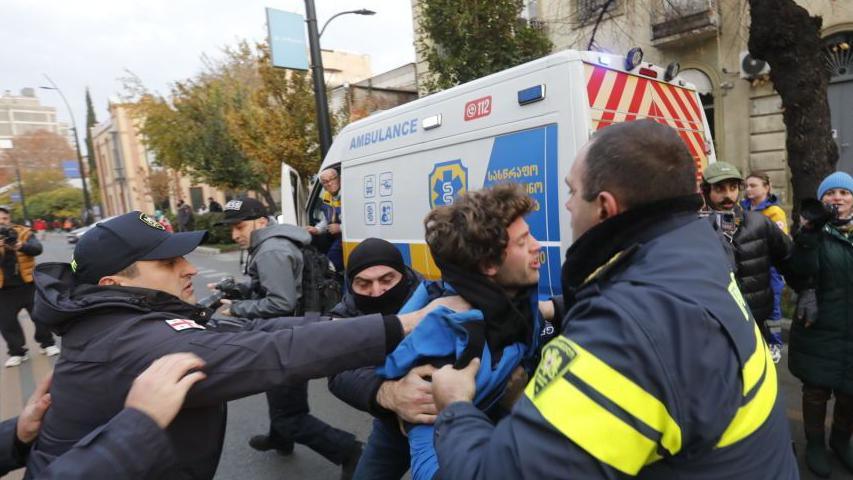
- Published16 November 2024
